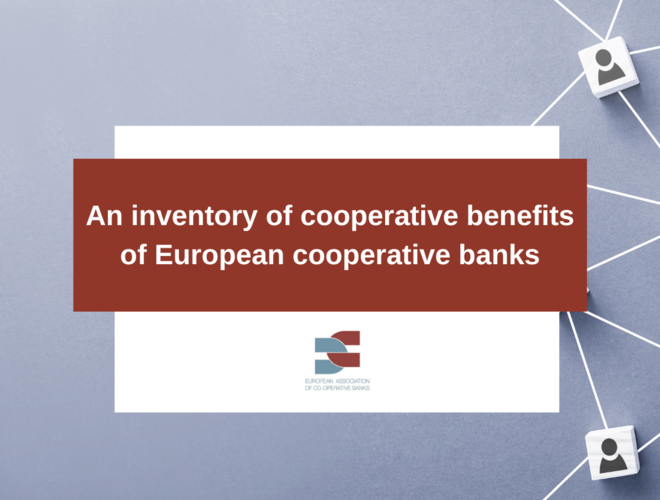The European Association of Co-operative Banks is pleased to announce the launch of a new study “An inventory of cooperative benefits of European cooperative banks” coordinated and co-authored by Prof. Hans Groeneveld, Director of International Cooperative Affairs at Rabobank and Professor at Tilburg University and Ryan van Hout, Senior Risk Advisor at Rabobank. The paper sheds light on the benefits of cooperative banking for members and society at large, based on a focused survey among 16 EACB members.
Prof. Hans Groeneveld stated: “European cooperative banks do not only grant (in)direct cooperative benefits to individual members but also aspire to contribute to the development of members’ living environment and to addressing (inter)national issues with a large impact on society. The latter goals may sound a bit pompous but are convincingly substantiated by real examples in society.”
The survey is part of a broader efforts on the 'Cooperative Difference' being investigated by the EACB Cooperative Identity Forum, chaired by Prof. Groeneveld. The exercise is meant to gradually cover a range of topics to help define commonly agreed indicators of the benefits of cooperative bankig. Ultimately, on which to foster EACB's key messages in the EU regulatory discussion.
"The study is of high relevance and a great value for the EACB and its members. It provides concrete findings and concise qualitative data on cooperative banking benefits for members, communities, and society at large. Thereby it allows us to demonstrate that cooperative banks are actors or even forerunners on socio-economic or environmental issues." declared Nina Schindler, EACB CEO.
Highlights of the paper:
The cooperative benefits identified can be classified into four areas:
-
Direct member benefits: Financial or non-monetary benefits stemming from the relationship between the bank and its members. Significant differences were identified in this area for each banking group.
-
Indirect member benefits: Primarily related to the rights and responsibilities of members within cooperative banks' formal governance structure.
-
Collective benefits for members' community: All groups present a range of initiatives geared toward improving the living environment of their members. Highlighting cooperative groups' longstanding commitment to proximity and, more broadly, their social focus.
-
Benefits for society at large from the group's perspective: This category reflects cooperative banks's ambition to contribute to addressing national and international demands. Among others, examples include supporting cooperatives in developing countries, leading public discussions on social and environmental matters, and providing assistance in public emergencies.



